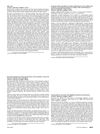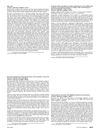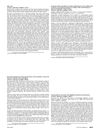
Search
for
Sort by
Research
540-570 / 628 results

research Hair Casts
Hair casts are often mistaken for head lice, scalp pain in hair loss is linked to certain nerve factors, eyelash growth treatment is safe and effective, and nail shedding in children may follow hand-foot-mouth disease.

research Increased Expression of Nerve Growth Factor and Neurokinin-1 Alarm the Hair Loss in Females with Trichodynia
Higher levels of certain nerve-related proteins are linked to hair loss in women with scalp pain.

research Long-Term Safety and Efficacy of Latisse (Bimatoprost 0.03% Solution) for Treatment of Eyelash Hypotrichosis in Subjects with Chemotherapy-Induced and Idiopathic Hypotrichosis
Latisse is safe and effective for long-term eyelash growth in people with thin eyelashes from chemotherapy or unknown causes.

research Onychomadesis Associated with Childhood Hand-Foot-Mouth Disease
Hand-foot-mouth disease may cause nail loss in children.

research Reporting on Adverse Clinical Events
Monitoring for adverse effects in clinical treatments is crucial.

research Literature Review on Atopic Dermatitis and Related Studies
Atopic dermatitis may have genetic causes and can be treated with pharmacologic methods, glycerin creams, and controlling Staphylococcus aureus colonization.
research Hair Loss Caused by Gain-of-Function Mutant TRPV3 Is Associated with Premature Differentiation of Follicular Keratinocytes
A gene mutation causes early keratinocyte maturation leading to hair loss in Olmsted syndrome.
research Substance P in Keratosis Follicularis Spinulosa Decalvans
Substance P may play a role in the inflammation seen in keratosis follicularis spinulosa decalvans.
research Immunofluorescent Findings and Clinical Overlap in Two Cases of Follicular Lichen Planus
GLPLS and LPP are variants of lichen planus.
research Two Clinically Unusual Cases of Folliculotropic Mycosis Fungoides: One with and the Other without Syringotropism
Some cases of folliculotropic mycosis fungoides may progress slowly and not need aggressive treatment.
research Desmoglein 4 Mutations Underlie Localized Autosomal Recessive Hypotrichosis in Humans, Mice, and Rats
Mutations in the DSG4 gene cause fragile, sparse hair in humans, mice, and rats.
research From Structural Resilience to Cell Specification: Intermediate Filaments as Regulators of Cell Fate
Intermediate filaments are crucial for cell differentiation and stem cell function.

research Patchy Hair Loss, Hyperpigmented Plaques, and Hyperkeratotic Papules in a Middle-Aged Woman
The patient responded well to treatment with no disease progression.

research Poster Presentations SG11 KRT14 Pathogenic Or Likely Pathogenic Variants Beyond Epidermolysis Bullosa: Dermatopathia Pigmentosa Reticularis
KRT14 gene variants cause dermatopathia pigmentosa reticularis, affecting nails, teeth, and hair.

research Genetic Hair Disorders: A Review
The conclusion is that genetic testing is important for diagnosing and treating various genetic hair disorders.
research Rapp-Hodgkin Syndrome: A Review of Hair and Hair Color Aspects
Rapp-Hodgkin syndrome, AEC, and EEC are different expressions of the same genetic disorder caused by TP63 gene mutations.
research Hidradenitis Suppurativa and Comorbid Disorder Biomarkers, Druggable Genes, New Drugs and Drug Repurposing—A Molecular Meta-Analysis
The study found key factors in the cause of hidradenitis suppurativa, its link to other diseases, and identified existing drugs that could potentially treat it.

research A Decade of Neglecting Sublingual Mass: A Case Report of Epidermoid Cyst
A man had a large, rare cyst in his mouth removed after 10 years, which fixed his swallowing and breathing problems.
research 1,314
The convention highlighted the importance of comprehensive patient care and early diagnosis in dermatology.
research 25-Year-Old Woman With New-Onset Seizures
A woman's new seizures were caused by a brain tumor likely linked to her past cancer treatment, and choosing safe seizure medications is important for women who can have children.
research Disruption of P2RY5, an Orphan G Protein–Coupled Receptor, Underlies Autosomal Recessive Woolly Hair
Mutations in the P2RY5 gene cause autosomal recessive woolly hair.
research The Genetics Of Alopecia Areata: New Approaches, New Findings, New Treatments
New genetic discoveries may lead to better treatments for alopecia areata.

research Photobiomodulation Therapy in Management of Cancer Therapy-Induced Side Effects: WALT Position Paper 2022
Photobiomodulation therapy helps manage cancer treatment side effects but needs more research for optimization.
research Pili Torti: A Feature of Numerous Congenital and Acquired Conditions
Pili torti is a rare condition where hair is twisted and breaks easily, often linked to genetic disorders or other health issues.

research Comparing the Frequency of Isotretinoin-Induced Hair Loss at <0.5 mg/kg/d Versus ≥0.5 mg/kg/d Dosing in Acne Patients: A Systematic Review
Higher doses of isotretinoin may lead to more hair loss.

research Forsythiasides: A Review of the Pharmacological Effects
Forsythiasides have multiple health benefits but may cause pseudoallergic reactions, and more research is needed.

research Hair Loss Induced by Tumor Necrosis Factor Alpha Inhibitors
Some drugs used to treat immune conditions may cause different types of hair loss.

research Beard Alopecia: An Updated and Comprehensive Review of Etiologies, Presentation and Treatment
Different causes of beard hair loss have various treatments, including medications, lifestyle changes, and procedures to stimulate hair growth.

research Hair and Nail Manifestations of Systemic Disease
Early baldness in men may indicate risks for obesity, metabolic syndrome, insulin resistance, and heart disease, similar to women with PCOS. Alopecia areata is often linked with autoimmune diseases and mental health issues. Certain hair disorders are due to genetic issues, and chemotherapy can cause hair loss through specific biological pathways. Iron deficiency's link to hair loss is still disputed.